CPChain Official Announcement on BETA Mainnet Launch
by CPChain at March 12, 2019
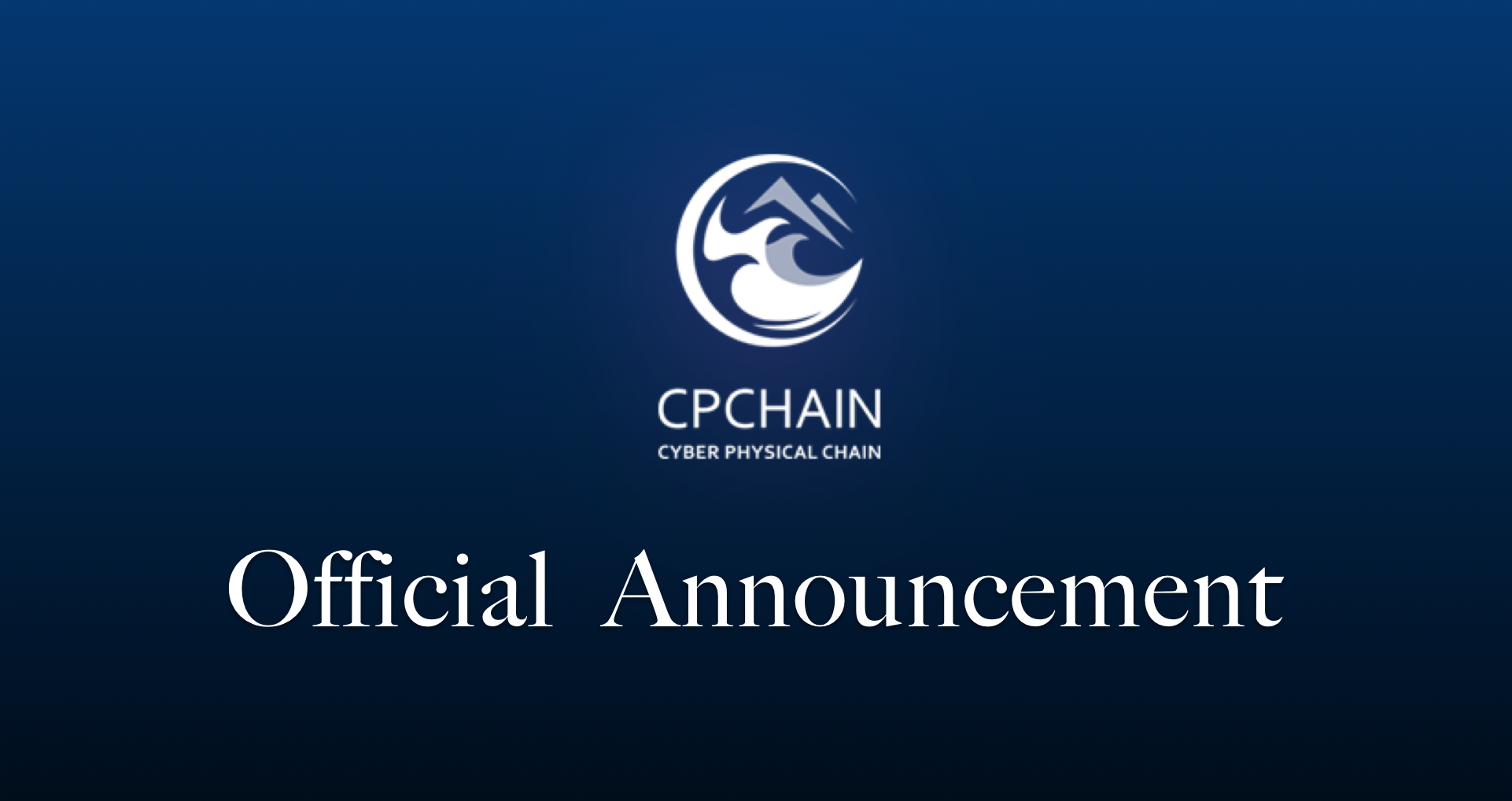
Dear CPChain community members,
Thank you for your continued support and engagement, we are blessed to have one of the best communities in the space! In the past year, CPChain's R&D team has developed a series of technical improvements to our ecosystem. Simultaneously working on the continuous iterative updating of the CPChain mainnet, with a primary focus on innovative functionality. At the end of December 2018, we released the Alpha version of the mainnet. In the beta version, the privacy transaction mechanism, LBFT2.0 algorithm, CPChain blockchain browser, as well as other additional features were added.
We are proud to announce that the Beta CPChain mainnet will be officially launched at the end of March.
In this Beta version, we will mainly include the following updates:
Node Incentive System
The construction of CPChain's ecosystem is a long-term process that is inseparable from the joint efforts of our IoT industry partners, CPChain developers, and CPChain community users. Therefore, a reasonable Node incentive mechanism is particularly important. At present, CPChain's incentive mechanism is divided into two phases: In the first phase, the CPChain Foundation acts as the main funding provider, undertaking the construction of the ecosystem and the maintenance of the main chain. The second phase relies mainly on usage and market adoption, with optimization of the CPChain ecosystem and the increase in shared data through CPChain’s platform, the incentives for running an RNode are mainly generated by profit from smart contracts and market transactions.
In the first phase, the RNode equity is divided into two parts: basic rewards and maintenance rewards.
A) Basic Reward
CPChain will create a reward pool of 5 million CPC (1.25 million CPC per quarter, approximately 13,700 CPC per day). The RNodes and economic nodes will receive the corresponding CPC reward based on the ratio of their locked margin to the total margin. (The margin lock-up period for both the economic node and the RNode is 90 days). The specific reward process is as follows:
Each season contains 90 days, which is also named as the lock-up period. There are 7 days reserved for fundraising at the beginning of each lock-up period. Each fundraising period is overlapped with the previous lock-up period. During this fundraising period, the following operations are allowed:
1. All ordinary users can deposit CPC into the reward pool, to become an economic node or RNode (the margin amount of the economic node: [20,000 – 200,000] the margin amount of the RNode: 200,000 – 5,000,000)
2. Nodes (Economic or RNode) that deposited funds into the reward pool in the previous quarter can choose whether to continue their deposit or renew the deposit value.
When a fundraising period ends, the following rules are applied:
1. The participating nodes cannot adjust or withdraw their deposits until next fundraising;
2. Nodes that decides not to continue to participate in the next lockup period will be refunded the deposited coins;
3. Changes in node deposit balances will result in potential changes to the CPChain node type;
4. All nodes during the current lock-up period will receive a reward from the pool.
** The bonus amount of a single node in the reward pool is related to its proportion of deposits in the current season. In other words, the basic reward calculation formula is 5,000,000 * d / D, where d is the deposit balance of a certain node, and D is the total value of the participating funds in the reward pool.
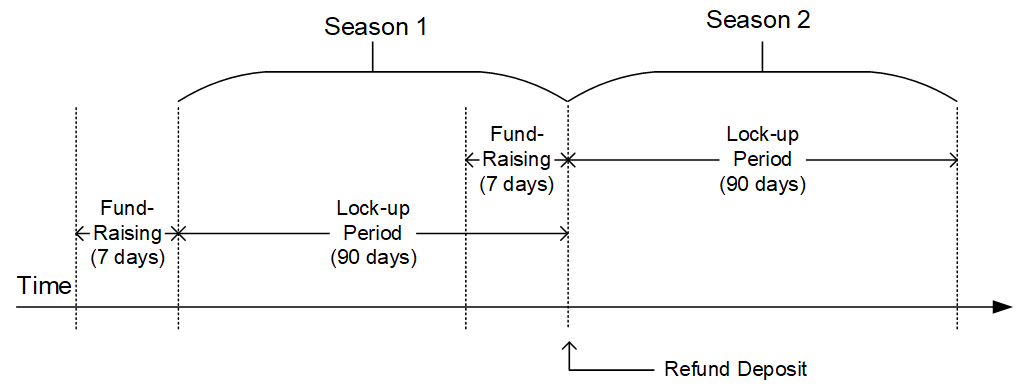
Lock-up Application Procedure
B) Maintenance Reward
When the block is successfully proposed onto the chain by the nodes in committee, the blockchain maintenance reward will be released. The RNode ecosystem stipulates that the annual supply of rewards will reduce yearly, with 40 million CPC in the first year followed by a 25% decrease per year in the next four years. Therefore, the annual supply for five years is 40 million, 30 million, 22.5 million, 17 million and 12.75 million. After five years, block maintenance will no longer generate rewards.
The CPChain mainnet adds one block every 10 seconds, which will generate about 3 million blocks per year. We summarize the annual reward distribution in the table below.
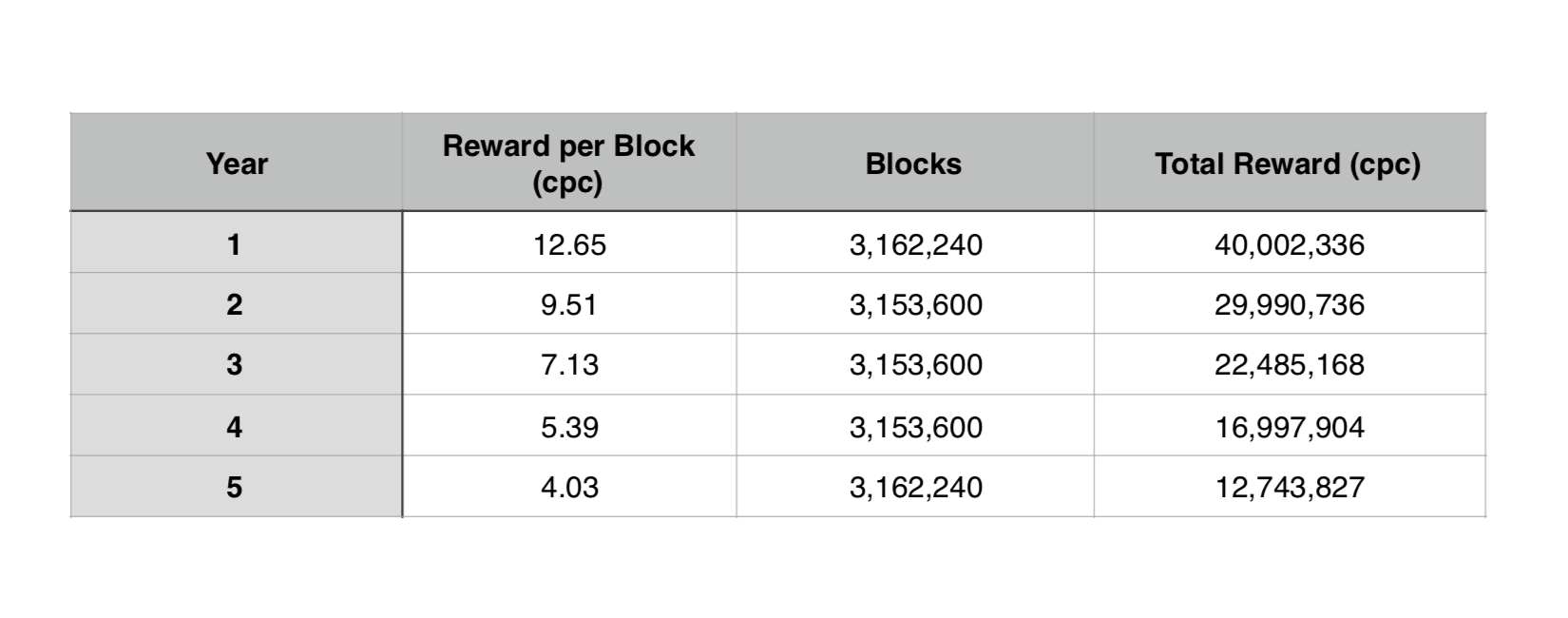
Block Reward Distribution
* Both the first year and the fifth year include the following days (February 29, 2020 and February 29, 2024, respectively), resulting in more blocks than the other three years.
Please note that in the LBFT 2.0 protocol, if the proposer has an error or does not respond, then an impeachment block will be inserted into the chain and the proposer who made an error or fails to respond will not be rewarded. Therefore, the actual annual CPC supply may be less than the figures listed above.
Abnormal Execution Handler Procedure
Abnormal execution refers to the handling of multiple scenarios in which issues arise between the proposer of the blocks and the validators of the blocks. The following conditions will be defined as abnormal:
1. A validator does not receive a block from the proposer:
2. The proposer proposes one or more faulty blocks
3. The proposer proposes multiple valid blocks
4. Some members in the validator committee are faulty
5. All other complicated abnormal cases
*Please go to our official website for specific technical details. Developers are welcome to join CPChain WeChat Group (China) or Telegram (Overseas) to communicate with us.
Recovery Mechanism
LBFT 2.0 provides liveness and safety under the assumption that at most one third of validators misbehave in a certain view. But without providing a recovery mechanism, the percentage of faulty validators would accumulate, outnumbering one third, and finally degrade the superior safety of LBFT 2.0. This motivates us to develop a sophisticated recovery mechanism, such that a delaying validator can catch up others.
Delaying validators are categorized into two different types according to how far behind they are: 1. The block height of a delaying validator is the same as the functioning validators 2. The validator delaying for at least a view.
Restore Cache
Once a block is validated and inserted into the chain, it can be labelled as permanent data. All permanent data is written in hard disks. In comparison, information like current state, collected signatures as well as block caches are temporary data. As temporary data is stored in volatile memory, it is not retained once a validator shuts down or restarts. Hence, before a validator shuts down, it writes all temporary data in a hard disk, and retrieves the data after it starts up.
Note that it is highly possible that a validator is lagging behind other committee members after it restarts. In this case, it processes the block as explained in the Unknown Ancestor Block section of our technical material.
Hardware Specifications
A) Minimum Requirement:
- Memory: 4GB
- Storage: 256GB
- CPU: Intel Xeon E5-1650 v3 (alike)
- Network: 300Mbps
B) Recommended Requirement:
- Memory: 16GB
- Storage: 1TB
- CPU: Intel Xeon E5-2686 v4 (alike)
- Network: 1Gbps
Please ensure the high online availability of the server. We *highly* recommend the interested participants to launch miner nodes in a cloud environment such as AWS and GCP. A typical setting would be t2.xlarge on AWS with enlarged disk space.
Wallet Prototype
A) Static Interface
▪Welcome page
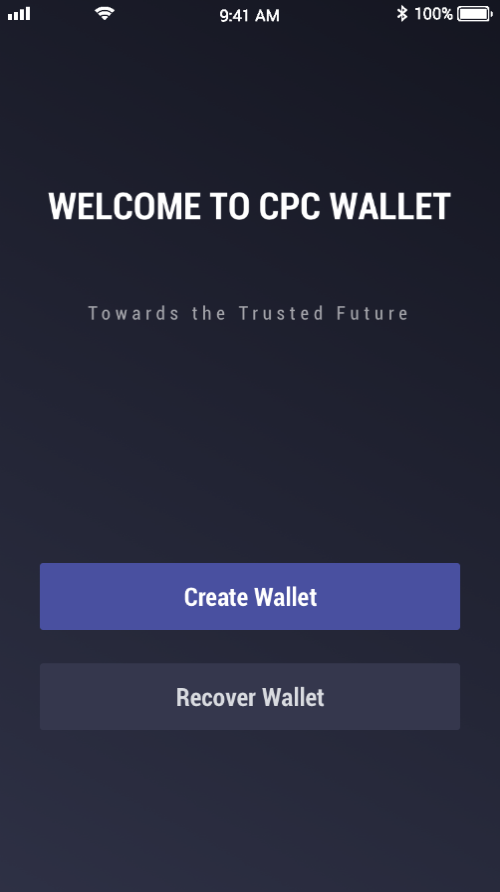
▪Mnemonic phrase page 助记词界面
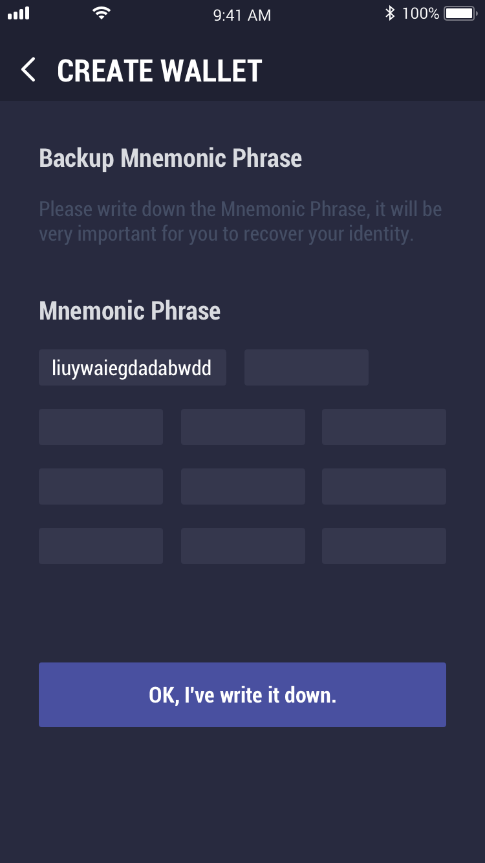
▪Register page 注册界面
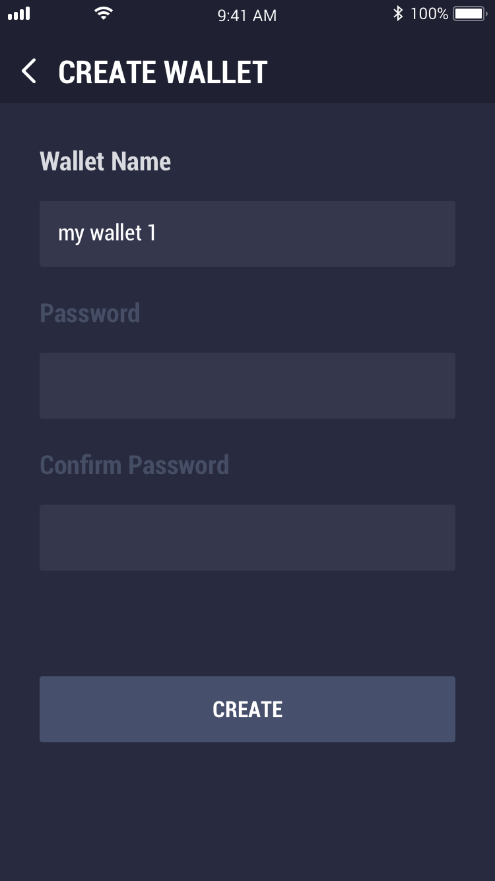
▪Transaction detail page 交易界面
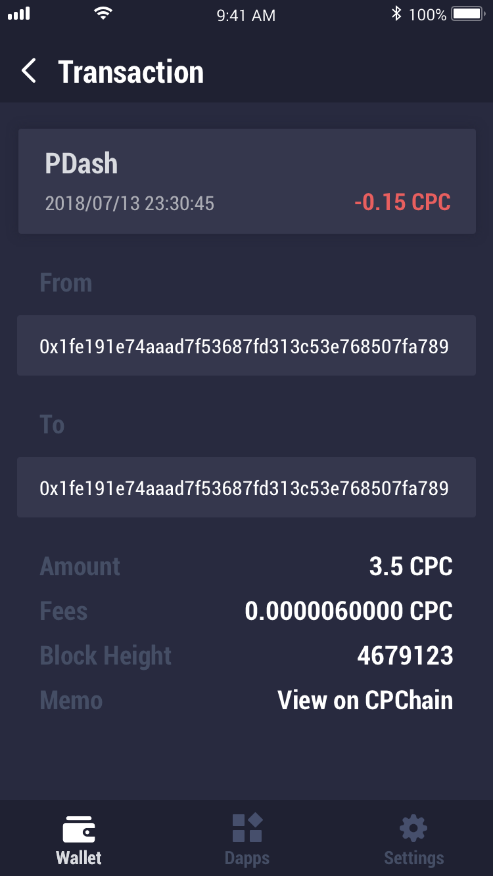
▪ Wallet main page 钱包主界面
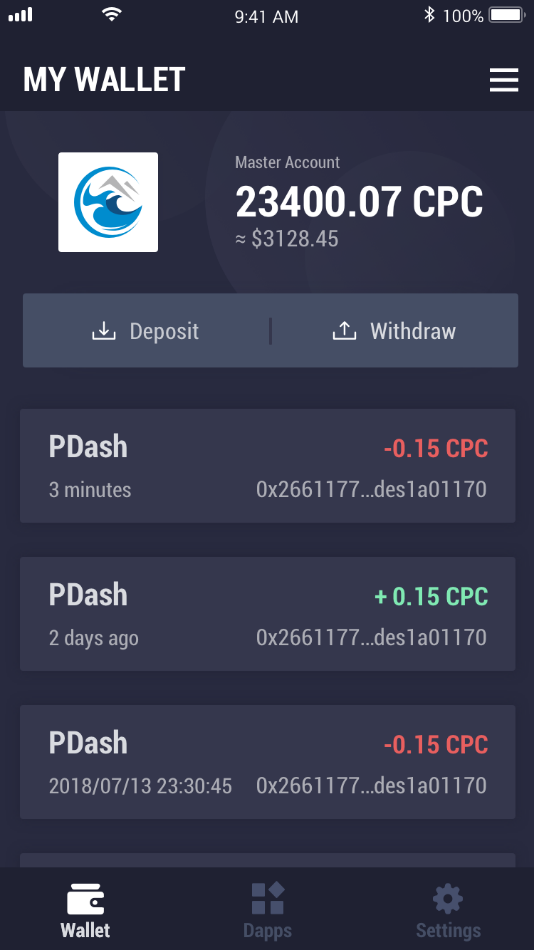
B) Newly Added Features
1. New account creation
2. Wallet account and mnemonic generation
3. QR code identification.
** A real-time recorded demonstration video will be released to the community afterwards.
The launch of CPChain's mainnet has been made possible by the efforts of the CPChain team, and the support and participation of the CPChain community. We strongly invite the community to participate in the beta and make valuable suggestions.
Event Update
1. The first MOBI Meet-Up Asia Stop will be held in Shanghai this April. CPChain will host the event and deliver an important speech for the Greater China region. We will synchronize the conference content to CPChain's official channels including TG and Twitter. In addition, CPChain will be releasing a concept video production explaining our Rnode ecosystem in the following days. The video details the generation, rights, and responsibilities of the honor node, which will help everyone understand the Rnode on a deeper level.
2. The Season 2 CPChain Pre-mainnet reward program has ended. After internal verification about the candidates. The final valid number of locked cpc in Season 2 is 85,384,176 cpc. The No. 1 - No. 3 Locked cpc amount are 12,000,000; 11,150,000; 5,000,000. All the reward for Season 2 will be released to the participants shortly. Meanwhile, the Season 3 Reward Program is also in schedule. We will reveal more details in the following week.
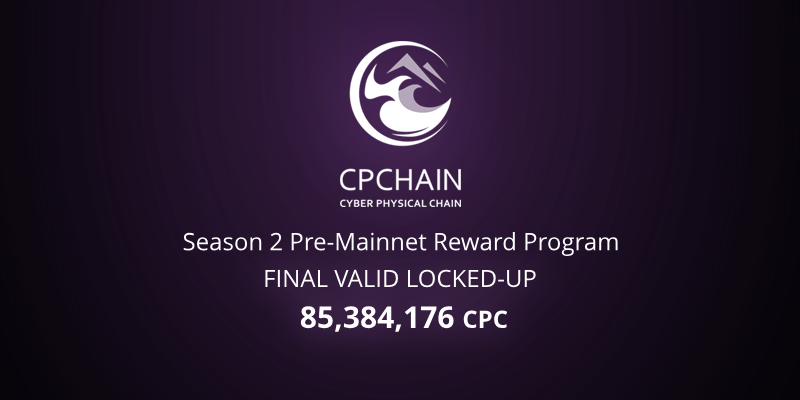
In the near future, CPChain will be releasing more project updates and related market cooperation news. So stay tuned!




